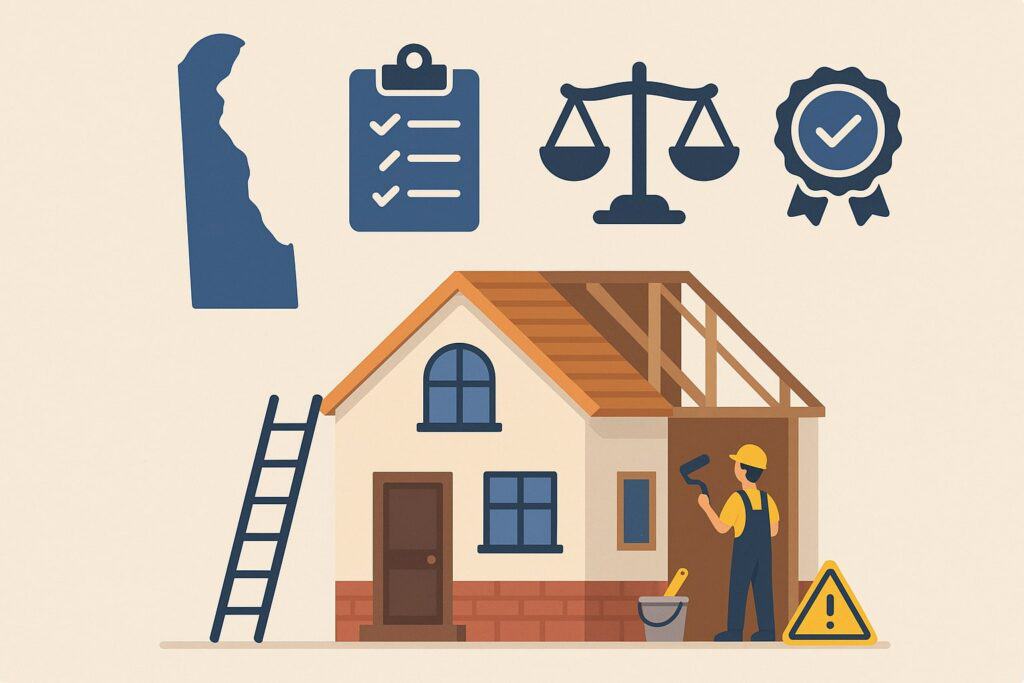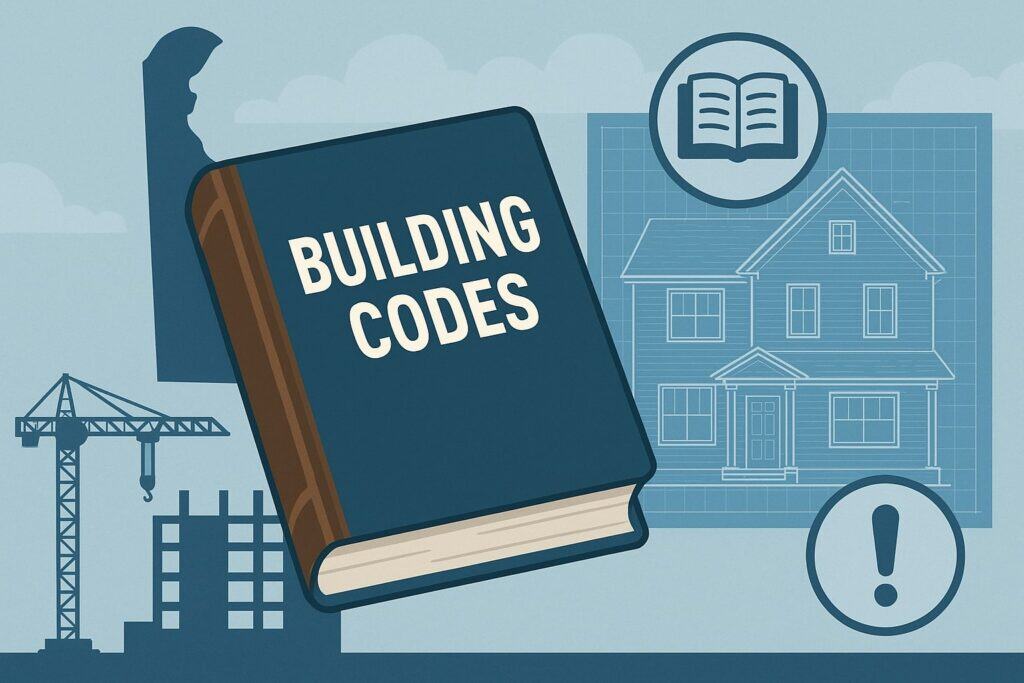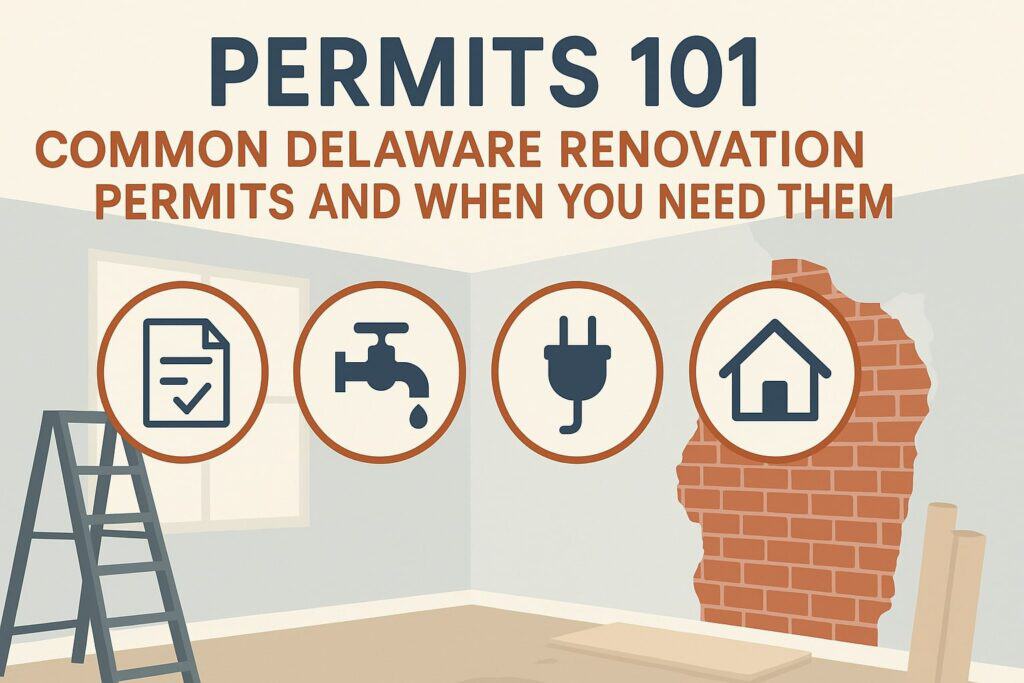
By 302renovations November 3, 2025
Renovating in Delaware can be exciting—and complex. Between county-by-county building codes, energy rules, floodplain requirements, historic reviews, licensed-trade work, and consumer-protection regulations, there’s a lot to get right before you demo a wall.
This Delaware renovation guide walks you through the essentials homeowners in Delaware should know before work begins: permits, codes, timelines, licensed contractors, stormwater and septic rules, historic approvals, energy-efficiency rebates, lead safety, contracts, liens, and more. It’s written for the First State and reflects current public sources as of November 3, 2025.
Understanding Who Regulates Your Delaware Renovation (State vs. County vs. City)

For any Delaware renovation, you’ll deal with local building departments first—typically New Castle County, Kent County, Sussex County, or a municipality like Wilmington, Lewes, or the City of New Castle.
Delaware sets state energy-code requirements and oversees many environmental permits (stormwater, floodplain guidance, septic). Practically, that means:
- Counties/municipalities issue building permits, do plan reviews, and conduct inspections. For example, New Castle County lists its permit portals and categories (additions, decks, renovations) in one place.
- The State (DNREC) administers building energy codes statewide and manages stormwater, floodplain, coastal, and septic programs that can affect your renovation.
- Code editions vary locally. New Castle County currently enforces the 2021 IBC/IRC family (and 2018 IECC), with county amendments. Always check your local adoption.
- Wilmington & towns run their own review processes and portals (e.g., Wilmington’s step-by-step development review).
Action for homeowners in Delaware: Identify your property’s jurisdiction, then confirm (1) required permits, (2) code edition and amendments, (3) whether your property is in a historic district, floodplain, or coastal zone, and (4) whether separate state permits (stormwater/septic) apply.
Delaware Building Codes: What Edition Applies and Why It Matters

Delaware ties its energy and plumbing requirements to national standards (IECC/ASHRAE). Local jurisdictions adopt and enforce the building and residential codes (IRC/IBC) and often publish their effective editions.
For example, New Castle County adopted the 2021 IBC/IRC effective Jan 1, 2024, and lists its IECC and IPC editions alongside county amendments.
Code edition dictates insulation R-values, smoke/carbon-monoxide alarms, stair geometry, egress windows, wind loads, pool barriers, and more—so specifying the wrong edition can cause redesigns or failed inspections.
When planning a Delaware renovation, ask your designer or contractor to call out the exact editions (e.g., “2021 IRC with NCC Chapter 6 amendments” for a New Castle County project) on drawings and scope.
If you’re in Kent or Sussex or a municipality like Wilmington, verify their editions and any local amendments or policy bulletins before you sign.
Permits 101: Common Delaware Renovation Permits and When You Need Them

Most structural changes, additions, significant interior renovations, basement finishes, egress windows, decks, pools/spas, roofing changes, window/door reconfigurations, and mechanical/electrical/plumbing (MEP) alterations require permits. Delaware homeowners should expect:
- Building permits for additions, structural work, finished basements, new bedrooms, or exterior changes that affect structure or egress. See New Castle County’s “Residential Addition & Renovation” page for a representative checklist and its Certificate of Awareness requirement.
- Trade permits (electrical, plumbing, HVAC) often require licensed trades under the Delaware Division of Professional Regulation (DPR) boards.
- Municipal processes like Wilmington’s development review and permit fee schedules.
- County portals to apply online, like Kent County’s MGO portal (with “Do I need a permit?” guidance) and Sussex County’s building pages.
Tip for a smooth Delaware renovation: Submit complete plans (code edition, site plan, product cut sheets), call out energy compliance (REScheck/IECC path where applicable), and coordinate MEP permits alongside building permits to prevent inspection delays.
Licensed Trades and Contractor Credentials in Delaware
Delaware does not run a statewide “general contractor” exam, but key trades (electrical, plumbing, HVACR) are licensed through DPR.
Boards update rules periodically—for instance, Delaware’s Plumbing/HVACR board updated continuing-education and restricted HVACR exam rules in 2025. If your Delaware renovation includes these scopes, hire DPR-licensed trades or require your GC to subcontract to them.
Also confirm your GC holds a Delaware business license and, if employing workers, is compliant with Department of Labor requirements (workers’ compensation/unemployment). Reputable licensing guides point out these obligations and the absence of a statewide GC exam, which still doesn’t remove trade-license needs.
Practical Delaware renovation step: Ask for DPR license numbers for electricians/plumbers/HVACR techs and verify active status; require insurance certificates (general liability and workers’ comp) naming you as certificate holder before work begins.
Environmental & Site Rules That Can Surprise Homeowners (Stormwater, Floodplains, Septic)
Many First State projects trigger environmental overlays:
- Stormwater & Land Disturbance: Delaware’s Sediment & Stormwater Regulations apply to most land-disturbing projects; 5,000 sq ft or more typically requires an approved plan or Residential Standard Plan (Sussex highlights this for building permits). Coordinate early if your addition, driveway, or grading crosses that threshold.
- Floodplains: If your lot is in an NFIP floodplain, expect stricter elevation, materials, and venting requirements plus potential substantial improvement triggers. DNREC’s Floodplain Management program offers maps and model ordinances that localities implement.
- Coastal construction: Beach, dune, and coastal-zone projects may require DNREC approvals separate from county permits. Factor this into schedule and design.
- Septic (On-Site Wastewater): Homes off sewer need DNREC site evaluations and septic permits for system changes or capacity increases (e.g., adding bedrooms). Use DNREC’s resources and ePermitting; don’t overlook this if your renovation changes plumbing loads.
Delaware renovation takeaway: Before you finalize plans, check parcel layers for floodplain/coastal overlays and measure disturbed areas. Engage your designer to incorporate stormwater and flood requirements up front to avoid redesigns.
Historic Districts and Design Review in Delaware
If your property sits in a local historic district (e.g., City of New Castle Historic Area, City of Lewes HPARC jurisdiction), exterior changes typically need a historic certificate or approval in addition to a building permit.
These bodies review materials, massing, and compatibility using the Secretary of the Interior’s Standards. Delaware also offers state historic tax credits for qualifying rehabilitation.
- City of New Castle: Historic Area Commission approval and a Historic Review Certificate are required for exterior work in the district. Submit applications well before meetings.
- City of Lewes: Projects in the Historic District go to HPARC; the building department routes applications and publishes FAQs and timelines.
- State incentives: Delaware’s Historic Preservation Tax Credit Program can reduce costs if your project meets standards; SHPO publishes application guidance and timelines.
Pro tip for a Delaware renovation in a historic area: Book a pre-application meeting, bring material samples (windows, siding, roofing), and cite the Standards directly in your narrative; this saves hearing time and revisions.
Energy-Efficiency Rules, IECC Compliance, and Delaware Rebates
Delaware ties building energy requirements to the International Energy Conservation Code (IECC) at the state level. Your project’s insulation, air-sealing, ducts, lighting, and mechanical systems must show IECC compliance (via prescriptive tables, performance modeling, or approved alternatives).
Designers commonly attach REScheck reports for additions and major renovations. DNREC’s energy codes page explains the statewide framework.
Even better: Energize Delaware offers Home Performance with ENERGY STAR® assessments and rebates/bonuses on air sealing, insulation, HVAC upgrades, and more—with 25% bonus incentives through Sept. 30, 2025 (over base rebates) for qualifying projects.
Their current rebate flyer lists specific incentive caps by measure; pair this with your renovation to reduce cost and improve comfort.
Delaware renovation tip: Schedule your home energy assessment early, then sequence air-sealing/insulation before drywall close-up. Keep contractor invoices and program paperwork for rebates.
Lead-Safe Rules for Pre-1978 Homes in Delaware
If your Delaware renovation touches paint in a pre-1978 home, you must follow the EPA Lead Renovation, Repair and Painting (RRP) rule: use lead-safe certified firms/workers, contain dust, and provide required disclosures.
Delaware’s Healthy Homes and Lead Poisoning Prevention Program oversees enforcement and contractor compliance statewide. This isn’t optional—violations can halt projects and create serious health risks.
Action: Ask your remodeler for their EPA RRP certification and Delaware-recognized lead credentials; require work plans for containment and cleanup—especially during window, door, trim, or plaster work.
Consumer Protection in Delaware: Your Contract, Your Rights, and the 3-Day Cancellation
Delaware’s Home Improvement Regulations (administered by the Department of Justice Consumer Protection Unit) set standards for home improvement contracts.
Among other things, contracts must include: contractor contact info, a meaningful description of the work, price/financing terms, an approximate completion date (or a conspicuous disclosure if none), and proper right-to-cancel notices when applicable (e.g., under 6 Del. C. §4404). The DOJ provides a concise summary and a detailed FAQ for homeowners.
Delaware renovation checklist for your contract:
- Full scope/specs, brands/models, permit responsibilities, draw schedule tied to milestones, warranty language, cleanup/disposal, change-order process, dispute venue, and proof of insurance.
- Inclusion of cancellation rights language where required.
- No blank spaces or “TBD” on final contract lines before signing (a prohibited practice).
Mechanics’ Liens in Delaware: How Owners Protect Themselves
Delaware law allows contractors and many subs to file mechanics’ liens if unpaid. While preliminary notice isn’t universally required, subs typically must file within 120 days of last furnishing on most private jobs.
For owners, an important statute requires contractors to provide certifications or lien-release documentation at certain payment points—failure can affect their business licensing. Understanding timelines and using conditional lien waivers at each progress payment can reduce risk.
Helpful owner tactics for a Delaware renovation:
- Require sworn conditional waivers from the GC and all tiers (subs, major suppliers) with each draw; exchange final unconditional waivers upon cleared payments.
- Consider asking subs to send a Notice of Intent before filing a lien if disputes arise; while not mandatory in Delaware, it can surface issues early.
County Snapshots: How Rules Vary Across Delaware
- New Castle County (NCC): Adopts 2021 IBC/IRC/IMC/IFGC/IPC/ISPSC and 2018 IECC with local amendments. Publishes resident-facing permit pages for Residential Additions & Renovations, including a Certificate of Awareness. Historic overlay projects may trigger Historic Review Board input.
- Kent County: Online permitting via MGO with clear “Do I need a permit?” lists (finished basements, garage conversions, roof changes, etc.) and homeowner electrical/plumbing permit info.
- Sussex County: Emphasizes Sediment & Erosion Control: projects disturbing ≥5,000 sq ft must submit a Residential Standard Plan as part of the building-permit package—engage early to avoid site-work delays.
- Wilmington (City): Publishes a step-by-step guide for development review and an applications portal with permits, inspections, and contact details. Check whether your project sits in a local historic district or overlay requiring extra approvals.
Historic municipalities (examples):
- City of New Castle: Historic Area Commission approval and a Historic Review Certificate required before building permits.
- City of Lewes: HPARC reviews exterior work in the Historic District; building department FAQs outline the process and contacts.
Budget, Contingency, Insurance, and Scheduling Realities in Delaware
Even with a tight scope, Delaware renovations face cost drivers: coastal/wind design, flood-resistant materials in mapped areas, stormwater planning, IECC upgrades, trade-license labor costs, and potential historic material requirements (true divided-lite windows, copper flashing, etc.).
Set a 10–20% contingency depending on your home’s age and exposure (pre-1978 lead risks, unknown framing). If you’re in a floodplain, plan for potential substantial improvement thresholds and elevation requirements that add both time and budget.
Insurance matters too: carry adequate homeowner coverage during construction; require contractors to provide GL and workers’ comp certificates. Confirm builder’s risk if scope is large (additions, major structural).
Integrate inspection timing (county + DPR-trade inspections + stormwater/final) into your schedule so you don’t miss seasonal windows for exterior work (e.g., DNREC restricts most open burning May–Sept; not a direct permit item, but a good reminder about seasonal constraints during site cleanup and yard work).
Step-by-Step: A Delaware Renovation Pre-Construction Checklist
- Jurisdiction check: County/municipality and whether you’re in a historic district, floodplain, or coastal area.
- Site constraints: Confirm lot coverage, setbacks, easements, and land disturbance area (5,000 sq ft threshold).
- Septic/utility: If on septic, line up DNREC site evaluation & septic permit; if public sewer/water, coordinate utility locates and any DelDOT frontage impacts.
- Team: Pick Delaware-experienced designer/GC; verify DPR trade licenses for MEP subs.
- Scope & code path: Lock code editions (e.g., 2021 IRC in NCC), energy compliance method, and product specs.
- Permitting: Prepare complete drawings, product cut sheets, energy documentation, stormwater plan (if needed), and historic applications (if applicable).
- Contracts & financing: Use a DOJ-compliant home improvement contract with milestones, warranties, and right-to-cancel language as applicable.
- Lead-safe plan: For pre-1978 homes, confirm RRP-certified firm and dust-control plan.
- Rebates: Book Energize Delaware assessment and reserve rebates/bonuses aligned with your schedule.
- Payment & liens: Use conditional lien waivers at each draw; collect final unconditional waivers at payout.
Common Permit & Inspection Pitfalls (and How Delaware Homeowners Avoid Them)
- Wrong code edition on drawings: Local adoptions vary; NCC uses 2021 code family with amendments. Confirm before drafting.
- Skipping stormwater planning: Additions + hardscape can push you over 5,000 sq ft disturbed—triggering a plan and inspections. Don’t start grading without approvals.
- Historic approvals after the fact: In New Castle or Lewes historic districts, approvals precede permits. Starting early prevents rework.
- Lead containment missteps: RRP compliance is mandatory for pre-1978 homes—hire certified firms to avoid stoppages and fines.
- Unlicensed trades: Electrical/plumbing/HVAC work must be done by DPR-licensed professionals (or permitted homeowners where allowed).
Financing Energy Upgrades Inside Your Renovation (Delaware Options)
Pair your renovation with air-sealing, insulation, right-sized heat pumps, and duct sealing to meet IECC and reduce bills.
Energize Delaware lists incentives for assessments, air-sealing performance improvements, insulation, and HVAC replacements—with a 25% bonus on top of base rebates through Sept. 30, 2025 for eligible projects. Keep the incentive matrix handy so your proposal and invoices match program language.
Delaware is also preparing IRA Home Energy Rebates (once DOE-approved), expected to fund electrification and efficiency measures like heat pumps, panel upgrades, insulation, and air sealing. Track DNREC’s updates to time your project.
Neighborhood & HOA Considerations in Delaware
Beyond permits, your Delaware renovation may need Association approvals for exteriors, fences, sheds, solar, and paint colors. While HOAs don’t replace official permits, they can delay construction if ignored.
Get written approvals and align submissions with historic and county reviews to avoid contradictory requirements (e.g., material selections).
Tip: Submit HOA and historic applications with the same spec sheets to maintain consistency across approvals. (General best practice aligned with local historic processes.)
Construction Phase
Plan for foundation/framing inspections, MEP roughs, insulation/air-seal inspections (IECC), and finals. If stormwater plans apply, expect site inspections as well. Keep a permit inspection log visible on site and schedule at least 48–72 hours ahead per your jurisdiction.
Change orders should be written, priced, and signed before work proceeds—especially in historic districts where materials and profiles matter. For close-out, collect final inspection approvals, CO/COC (if applicable), warranty docs, lien waivers, and rebate paperwork.
FAQs
Q1) Do I always need a building permit for interior work in Delaware?
Answer: If you’re altering structure, egress, bathrooms/kitchens (plumbing), HVAC, or electrical, you’ll likely need permits. Counties like Kent list typical permit triggers (finished basements, garage conversions, roof changes, etc.). When in doubt, call your local building office before starting your Delaware renovation.
Q2) What code applies to my addition’s insulation and windows?
Answer: Energy compliance follows the IECC framework Delaware ties to state law, but local jurisdictions specify adopted editions and amendments. In New Castle County, for example, building codes reference the 2018 IECC (effective 1/1/21). Always verify your jurisdiction’s current edition.
Q3) My property is in a flood zone—what does that change?
Answer: Floodplain projects often require flood-resistant materials, venting, elevation checks, and can trigger substantial improvement calculations. Coordinate with your local floodplain administrator and review DNREC guidance before drawing plans.
Q4) Who needs to be licensed in Delaware for my renovation?
Answer: Electricians, plumbers, and HVACR professionals must be licensed through the Delaware Division of Professional Regulation; some regulations were updated in 2025. Your GC should either hold appropriate trade licenses or subcontract to DPR-licensed pros.
Q5) Is lead paint really a big deal for older Delaware homes?
Answer: Yes. For pre-1978 homes, EPA RRP rules require certified firms and lead-safe practices; Delaware’s Healthy Homes program enforces compliance statewide and publishes guidance.
Q6) How can I protect myself from mechanics’ liens?
Answer: Use conditional lien waivers tied to each payment, collect final unconditional waivers at completion, and ensure your contractor provides lien-release documentation required by Delaware law. Know that subs typically have 120 days to file after last furnishing.
Q7) Are there Delaware-specific rebates or incentives I should line up?
Answer: Yes—Energize Delaware’s Home Performance with ENERGY STAR® program offers rebates for assessments, air sealing, insulation, and HVAC, with bonus incentives through Sept. 30, 2025. DNREC is also preparing IRA Home Energy Rebates (watch for launch updates).
Q8) I’m renovating in a historic district (Lewes/New Castle). Which approval comes first?
Answer: Get your historic certificate/approval before or concurrent with your building permit application—both Lewes HPARC and New Castle HAC require prior approval for exterior work. Coordinate materials and drawings to satisfy both processes.
Conclusion
A successful Delaware renovation blends local permit compliance, state energy and environmental rules, and smart homeowner protections. Start with jurisdiction checks, then design to the correct code edition and site constraints (stormwater, floodplain, septic).
Use DPR-licensed trades, lead-safe methods for pre-1978 homes, and consumer-compliant contracts with clear scopes and cancellation rights. Build in lien protections and capture Energize Delaware rebates while you’re at it.
When in doubt, ask your local building department to confirm permit triggers and code editions, and check DNREC for environmental overlays and energy rules. With the right prep, your Delaware renovation will be compliant, energy-efficient, historically appropriate where needed, and easier on your budget.